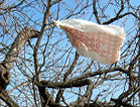COUNTRY LIFE Manifesto: A Ban on Plastic Bags
The amount of packaging used in supermarkets is having a terrible effect, on wildlife and the environment, and plastic bags are a curse on our landscape.


Autumn comes, and the countryside prepares to put on its tweed, take out the sloe gin and enjoy the magic of this bonfire-smoky season. But as the leaves come off, one sight causes displeasure.
Plastic bags: festooned on hedges, they are even more of an eyesore in the countryside than in towns. They are evidence of something that every countryman abhors?waste. Who needs plastic bags when you can carry a shopping basket? Who asked supermarkets to put tomatoes on a plastic tray? Most of us do come home with plastic bags filled with grossly over-packaged produce (how much of our money goes on plastic and how much gets to the farmer?), but that is the system. Supermarkets dominate food retailing in Britain. They have forced local shops to close. They have a responsibility to cut waste. Our Countryside Manifesto demands that they do so.
The Government can help by introducing a plastic-bag tax, such as exists in Eire. If every bag cost 10p, alternatives would soon be found. A bill on these lines is currently before the Scottish Parliament. A report of the Scottish Environment and Rural Development Committee reveals the extent of the problem. A survey by the Marine Conservation Society carried out in 2003 revealed that every kilometre of coastline is likely to be adorned by 43 plastic bags. The damage that they do to animals and fish is incalculable, because the effects go undetected. According to the UK Compostable Packaging Group, some developing countries (such as Bangladesh, Eritrea, India and Kenya) have banned plastic bags because of their effect on wildlife, as well as flood drains. To them, it must seem typical of the profligacy of the developed world that it continues to use plastic bags with abandon.
Shoppers care about over-packaging. Days after our Manifesto was published, Sainsbury's announced that it was going to do something. Packaging from its stores currently accounts for a monstrous 3,500 tons of landfill each year. It is now switching to packaging that can be composted. The new packaging fulfils the same function as plastic, but is derived from maize and sugar cane rather than oil. The problem is the shortage of compostable material. (Where it is not available, the store will use recyclable plastic.)
Country Life readers know the joy of composting. The aim must now be for every household to have a home-composting bin. But there are alternatives even to composting. A couple of years ago, the Co-Op came up with a startling initiative: tomato purée sold as a tube, not in a cardboard box. Good heavens. One less cardboard box to throw away. One tiny step for mankind. Tetley has undergone a similar journey. It no longer sells tea in film-wrapped boxes, but in resealable paper bags.
It can be done. Visitors to the old Soviet Union will remember that life could function perfectly well (almost) with virtually no packaging. So rare were plastic bags that, on beaches, swimmers could be seen making after ones that were being carried out to sea.
In 2004, the Government established an £8 million innovation fund, administered by the Waste and Resources Action Programme (WRAP), to help research new ways to package. Supermarkets are slowly waking up to the challenge. So far, they have not got much beyond a yawn and a stretch. Consumer anxiety ought to have spurred them into action.
Exquisite houses, the beauty of Nature, and how to get the most from your life, straight to your inbox.
Instead, they are moving at the pace of a schoolboy who knows he has not done his Latin prep. We applaud the Women's Institute. In June, it held a Packaging Day of Action, on which its members returned all their unwanted packaging to supermarkets. Why do this on only one day in the year? Concerned readers should take back plastic trays, styrofoam blocks, over-elaborate cardboard boxes (think of Easter eggs) and other redundant packaging to the shop that it came from. Ask to see the manager and present it with compliments. The message will soon get through. Supermarkets, stop dawdling: get to work.
Country Life is unlike any other magazine: the only glossy weekly on the newsstand and the only magazine that has been guest-edited by His Majesty The King not once, but twice. It is a celebration of modern rural life and all its diverse joys and pleasures — that was first published in Queen Victoria's Diamond Jubilee year. Our eclectic mixture of witty and informative content — from the most up-to-date property news and commentary and a coveted glimpse inside some of the UK's best houses and gardens, to gardening, the arts and interior design, written by experts in their field — still cannot be found in print or online, anywhere else.
